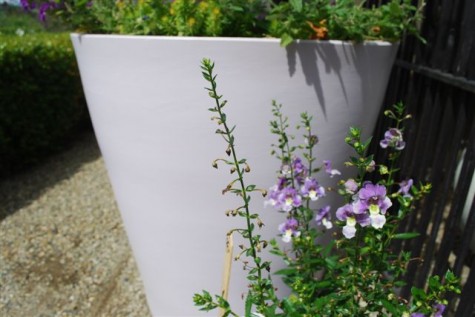
I hear too often from people that their pots peter out in August. There is no need for that, barring your dog unearthing them, or a hailstorm. I usually take my pots apart in November, as I am just plain tired of taking care of them. But here’s my formula for longevity through August and beyond. First off, water, and water properly-which can mean, water even when you don’t feel like it. This means soak your pots, and then let them get dryish before you water again. Secondly, deadhead regularly; do not let you annual flowers go to seed.
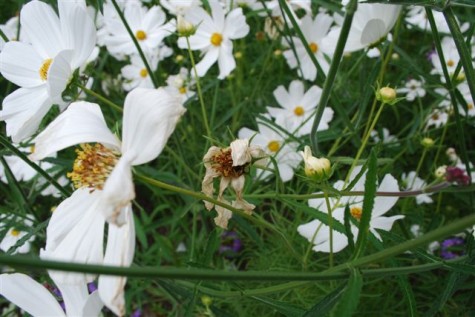
Here’s the biology behind the scenes. Annual plants by definition are plants that grow, flower, and set seed in one season. An annual which has successfully set seed has no biological reason to continue to flower. For those of you who think annuals bloom so the world will be a more beautiful place, here here. These plants flower for the purpose of reproduction-to insure the continuation of the species. If you prevent an annual from setting seed, it will continue to flower. There are plenty of flowers which are sterile, and do not set seed; they are popular for exactly this reason. Trailing verbena, on the other hand, will go out of flower quickly, if it is not deadheaded.
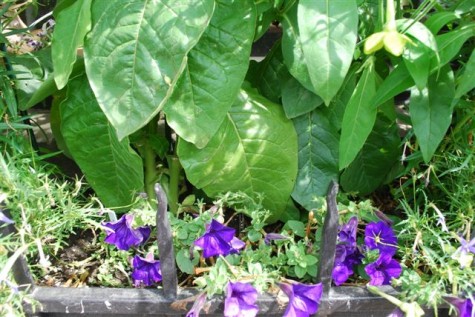 Plants grow in, and the room can get crowded. If the giant leaves of this nicotiana are allowed to shade the petunia, said petunia will pout, and finally give up. Removing leaves, or branches so everyone has a sunny spot, is good group management. A pot or window box is no place for a bully running amok. No one will like the result- least of all, you.
Plants grow in, and the room can get crowded. If the giant leaves of this nicotiana are allowed to shade the petunia, said petunia will pout, and finally give up. Removing leaves, or branches so everyone has a sunny spot, is good group management. A pot or window box is no place for a bully running amok. No one will like the result- least of all, you.
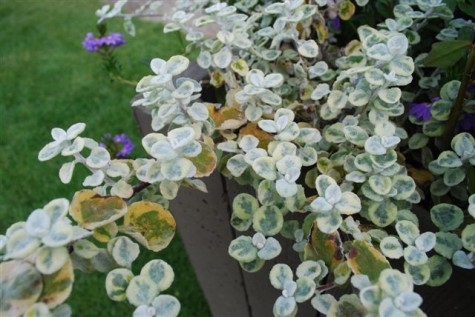 Try not to overwater. Put your finger down into the dirt. If the dirt sticks to you, there is probably enough moisture. Rotting leaves are unsightly. Worse yet, an environment that is too wet is an invitation to every fungus floating by, looking for a good home. Licorice likes dry conditions. Should you have been so bold to plant it next to an annual that loves water and more water, you’ve engineered a situation where individual plants in a community pot have to be watered on different schedules. This is not tough, just time-consuming.
Try not to overwater. Put your finger down into the dirt. If the dirt sticks to you, there is probably enough moisture. Rotting leaves are unsightly. Worse yet, an environment that is too wet is an invitation to every fungus floating by, looking for a good home. Licorice likes dry conditions. Should you have been so bold to plant it next to an annual that loves water and more water, you’ve engineered a situation where individual plants in a community pot have to be watered on different schedules. This is not tough, just time-consuming.
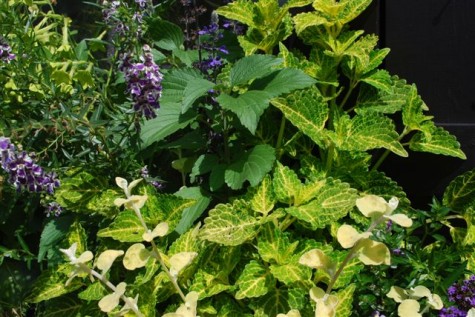 Annuals need pruning, just like shrubs and trees. Pruning the flowers from your coleus plants result in densely growing coleus. Pruning plants at different heights gives everyone breathing room. Once a group of plants are put together in one pot, or one area, they take on a collective life. Sun, water and space have to be shared. And whatever the individual plants, you want an overall shape that looks great.
Annuals need pruning, just like shrubs and trees. Pruning the flowers from your coleus plants result in densely growing coleus. Pruning plants at different heights gives everyone breathing room. Once a group of plants are put together in one pot, or one area, they take on a collective life. Sun, water and space have to be shared. And whatever the individual plants, you want an overall shape that looks great. 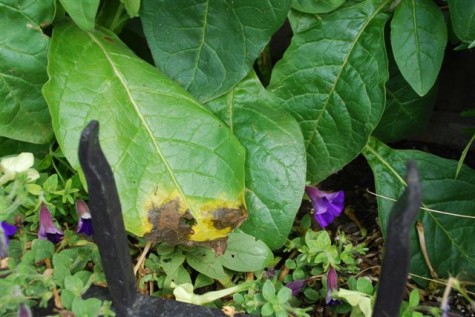
Plants that are healthy resist disease. Healthy means properly watered, fed, pruned and managed. If you do get a fungus, remove the diseased portions as soon as you can. Remove lower leaves in the interiors of your pots to promote good air circulation. Prevention is a lot easier that treatment. Sometimes weather conditions foster disease; I will spray with a fungicide if I have to. Safer’s soap will get rid of some insect pests-the trick is to apply 3 rounds, not one. Spider mites are notoriously difficult to get rid of. I avoid certain types of mandevilleas as they are so prone to them.
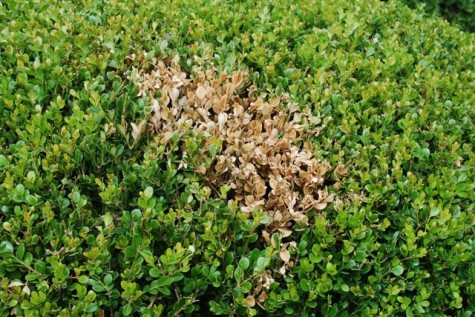 My beloved boxwood hedge was attacked this spring by a fungus called Volutella-I was beside myself over the damage. I had to get an expert to identify it for me; I have never seen this on boxwood before. We cleaned out, and raked up every dead leaf, and pruned out every infected branch with shears that were disinfected after each cut. Next spring I will spray for it. Imagine being a greenhouse grower-where plant illnesses and insects can threaten a livlihood. Most growers that I know practice close inspection of their plants, so they catch problems early. They also feed their plants; strong plants resist trouble. Once every seven to ten days I make sure my pots are thoroughly watered, then I liquid- feed them with a water soluble fertilizer with a big middle number (15-30-15) to encourage good flower production. This acts like a shot of vitamin B-12. Then I hold off watering as long as I can, so the plants take up the nutrients, before they get flushed out by the next round of watering.
My beloved boxwood hedge was attacked this spring by a fungus called Volutella-I was beside myself over the damage. I had to get an expert to identify it for me; I have never seen this on boxwood before. We cleaned out, and raked up every dead leaf, and pruned out every infected branch with shears that were disinfected after each cut. Next spring I will spray for it. Imagine being a greenhouse grower-where plant illnesses and insects can threaten a livlihood. Most growers that I know practice close inspection of their plants, so they catch problems early. They also feed their plants; strong plants resist trouble. Once every seven to ten days I make sure my pots are thoroughly watered, then I liquid- feed them with a water soluble fertilizer with a big middle number (15-30-15) to encourage good flower production. This acts like a shot of vitamin B-12. Then I hold off watering as long as I can, so the plants take up the nutrients, before they get flushed out by the next round of watering.
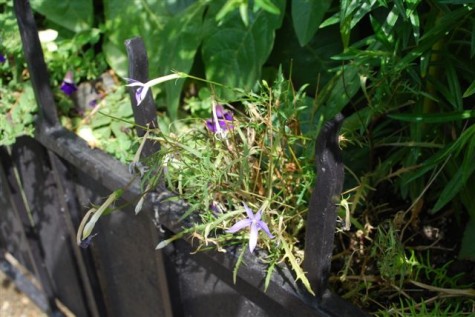
There will be those times when no amount of good growing practices and cultures will result in a good plant. Don’t be afraid to yank something that is clearly beyond rescue. Perfection applies only to diamonds and moments, remember?